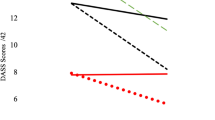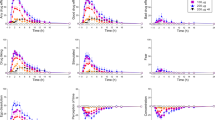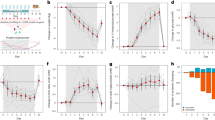Abstract
RECENT progress in the production of radioactive isotopes by neutron bombardment makes the radioactive isotope of phosphorus 15P32 easily accessible. This isotope, which has a half-life value of 17 days, can be utilised as an indicator of inactive phosphorus in the same way that the radioactive isotopes of lead, bismuth and so on were formerly used as indicators of these elements. If, for example, we add active 15P32 to 1 mgm. of inactive phosphorus in such quantity that the Geiger counter registers 1,000 impulses per minute, carry out with the phosphorus activated in this way any sort of chemical or biological reaction and then find that the product obtained gives 1 impulse per minute, we may conclude that 1/1,000 mgm. of the phosphorus originally introduced is present in the product investigated.
This is a preview of subscription content, access via your institution
Access options
Subscribe to this journal
Receive 51 print issues and online access
$199.00 per year
only $3.90 per issue
Buy this article
- Purchase on Springer Link
- Instant access to full article PDF
Prices may be subject to local taxes which are calculated during checkout
Similar content being viewed by others
Author information
Authors and Affiliations
Rights and permissions
About this article
Cite this article
CHIEWITZ, O., HEVESY, G. Radioactive Indicators in the Study of Phosphorus Metabolism in Rats. Nature 136, 754–755 (1935). https://doi.org/10.1038/136754a0
Published:
Issue Date:
DOI: https://doi.org/10.1038/136754a0
This article is cited by
-
Guest Edited Collection: Radioisotopes and radiochemistry in health science
Scientific Reports (2020)
-
George de Hevesy (1885–1966): discoverer of hafnium, founder of radioanalytical chemistry and X-ray fluorescence analysis and father of nuclear medicine
Journal of Radioanalytical and Nuclear Chemistry (2017)
-
Functional imaging for regenerative medicine
Stem Cell Research & Therapy (2016)
-
Nothing new under the nuclear sun: towards 80 years of theranostics in nuclear medicine
European Journal of Nuclear Medicine and Molecular Imaging (2014)
Comments
By submitting a comment you agree to abide by our Terms and Community Guidelines. If you find something abusive or that does not comply with our terms or guidelines please flag it as inappropriate.



